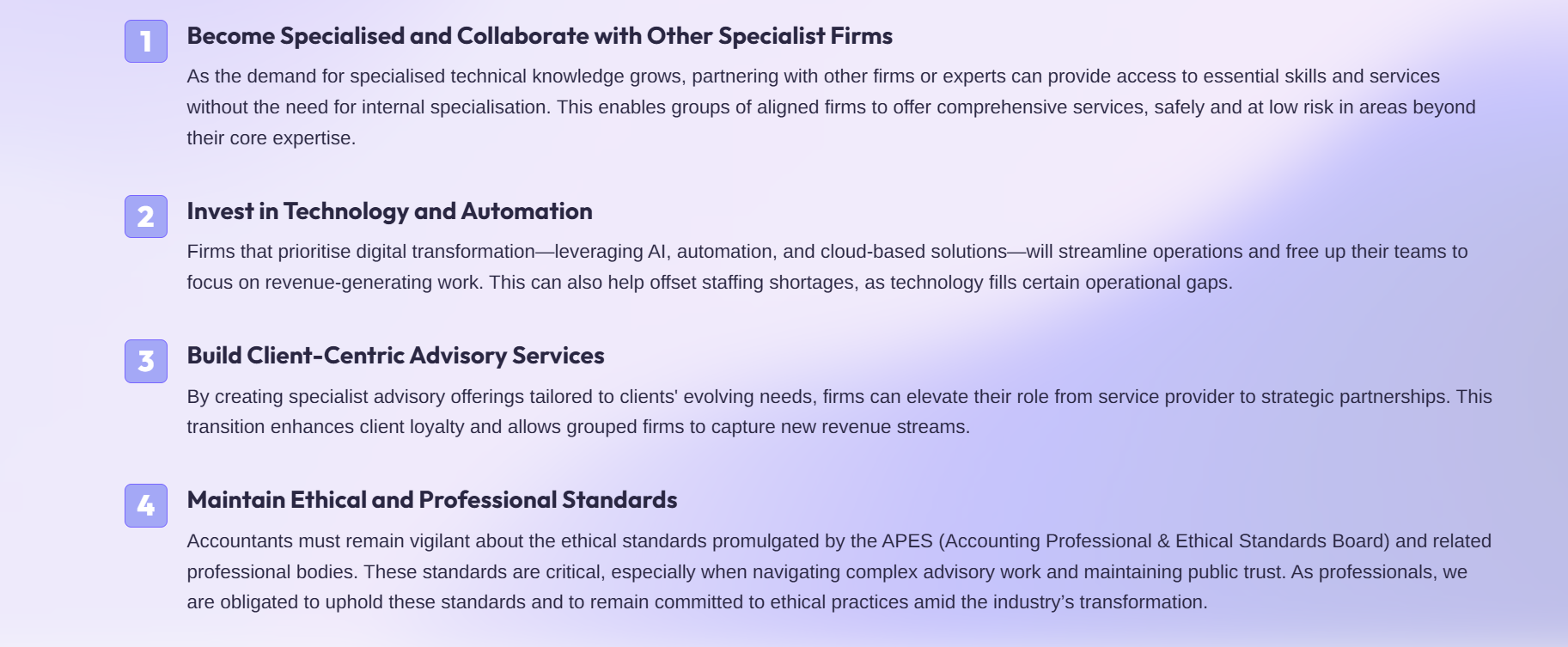
The accounting profession in Australia stands at a critical juncture. With the talent pipeline shrinking and the demand for skilled accountants growing, the sector is confronting a convergence of external pressures, rapid technological advancements, and heightened client expectations. This white paper examines these challenges and explores strategies for accounting practices to adapt, grow, and thrive in this dynamic environment.
The Skills Shortage in Accounting
The talent gap in Australia is clear: CPA Australia’s 2024 report indicates that the number of graduates completing accounting programs has nearly halved in the last decade, now totalling only 2,278 annually. Meanwhile, the number of accounting firms has steadily risen, now reaching 37,428, all competing for a limited pool of talent. With only a fraction of new graduates entering the field each year, the profession is grappling with an acute shortage of skilled accountants, creating a bottleneck for growth and operational efficiency.

External Pressures and Regulatory Compliance
Accountants are navigating an increasingly complex regulatory landscape. Compliance with updated tax laws, sustainability standards, and new reporting requirements is only the tip of the pressing challenges. The impending Australian Sustainability Reporting Standards will only heighten this demand, adding to the need for accountants to develop advisory competencies to support clients with climate-related disclosures and regulatory compliance.

Adapting to Technological Advancements
Technology is transforming traditional accounting. Automation, AI, and cloud solutions offer new efficiencies but also disrupt traditional roles and require constant upskilling. Basic compliance and bookkeeping services are being commoditised, pushing firms to embrace strategic advisory services that deliver higher-value insights to clients.
The largest firms—especially the Big Four—have seized on this shift. They invest heavily in technology and advisory capacity, securing their dominance in a consolidating market. Smaller and mid-sized firms, however, face steeper challenges. Without the same resources, they risk falling behind unless they adapt by integrating technology thoughtfully and leveraging strategic partnerships.

Shifting Focus from Compliance to Advisory
In response to changing market demands, accounting services are evolving. Tax, audit, and compliance still form the core of most firms, but the real growth is in specialised advisory services. Firms that successfully transition into advisory work benefit from:

Challenges in Transformation
Moving from compliance-focused to advisory-oriented services requires significant internal change. Firms can choose to be a “jack-of-all-trades; master of none” – or transition to clustered specialisations. The task to align and develop core skills, invest in advanced data analytics, and shift a teams’ mindset toward strategic specialist work won’t decrease revenue – but it will increase profitability. While daunting, these changes position firms to deliver the high-value insights that clients increasingly demand.
Strategies for Future-Proofing Accounting Practices

Conclusion
The accounting profession in Australia is not immune to the ongoing professional skills shortage. However, by adapting to technological advancements, embracing collaboration, and focusing on clustered services, firms can position themselves to succeed in a competitive market.
In these times of change, I encourage fellow accountants and practice owners to take proactive steps to future-proof their businesses. If you’re interested in exploring how to transition effectively while upholding the highest standards, feel free to reach out. Let’s work together to ensure our industry meets these challenges head-on, bringing value to clients and fostering a sustainable future for our profession.

Do you want to know more? Kevin Lovewell is an Accountant and Registered Business Valuer – He works as a Business Intermediary acting as a seller or buyer agent and as the principal agent in complex M&A projects; he is an active business valuer in the Small to Medium (SME) Market regularly undertaking work in appraising SME businesses for their market value.

Kevin Lovewell
M: 0401 308 385
P: 1300 551 757
E: Click here to contact Kevin Lovewell
Member & Registered Business Valuer
Australian Institute of Business Brokers

Jessica Holbrook
P: 1300 551 757
E: Click here to contact Negotia Group
Business Analyst